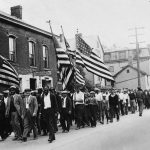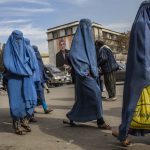Musicians working together can change the world
American clarinettist and composer Angel Bat Dawid and South African drummer Asher Gamedze talk free jazz, collective collaboration and dismantling the system.
Author:
27 January 2020

Landing in Johannesburg in 2018, United States clarinettist, composer and conductor Angel Bat Dawid says she immediately felt “a sense of relief and happiness”.
“I hadn’t realised how much living in America and manoeuvering in WEIRD [white, educated, industrialised, rich, ‘democracy’] spaces takes a pressurised toll on people of colour daily.” Partly, it was the “beauty of being around so many black folks”, but there was also a tangible sense of return. Her father, a Baptist missionary, relocated the family to Kenya for five years when she was seven; she did much of her growing up in Africa.
Related article:
Recent years have been equally formative for the now Chicago-based Bat Dawid (christened Angel Elmore, Bat Dawid is her stage name). The prohibitive cost of treatment for a brain tumour forced her to quit university. She worked at an exclusive lingerie boutique, then a record store, developed skills in hip-hop production and, alongside this, deepened her engagement with playing. In 2014, she cashed in her pension fund and jumped into music full time.
Learning more every day about the rich, free jazz legacy of her city, which boasts the Association for the Advancement of Creative Musicians (AACM) and the Art Ensemble of Chicago, and finding a supportive community in the improvised music scene there, Bat Dawid intensified her composing. Some musicians she worked with couldn’t read scores, so she used her iPhone to mix tracks as rehearsal aids. When influential jazz label International Anthem mooted a recording, she submitted those files. With very little adjustment, they became one of the hit jazz albums of 2019 worldwide, The Oracle.
A track listeners often single out is Capetown, an intense 15-minute jam with South African drummer Asher Simiso Gamedze. Making that track led to Gamedze visiting Chicago in March, joining Bat Dawid’s outfit The Brothahood, and touring Europe, including a gig at the London Jazz Festival in November. What unites the two musicians, whose musical ideas brewed nearly 14 000km apart, is a shared vision of how working together can unleash power for musical and social change.
The practice of listening
Bat Dawid fell in love with music after seeing the Mozart film Amadeus, started piano lessons at 12 and was allocated a clarinet in her school band. But it was Mozart again – the Clarinet Concerto in A Major – that opened her ears to the instrument’s possibilities, and hearing her father’s Sun Ra recordings that “freed me from the page” when she played.
Gamedze started playing drums at high school, borrowing a friend’s kit to learn. He attended every gig he could, in every genre, in Gauteng and later at university in Cape Town. By then he was gigging, too, “and that is still my music school. Those of us who don’t go to music school make the curriculum as we go, always with other musicians, always open, exciting, unfinished … and indirectly, through the collective practice of listening.”
Listening introduced him to the AACM, “but much as I loved that music, it was so far away, it was almost surreal, an idea”.
Their common ground in free jazz – which Gamedze had researched as well as admired – generated musical electricity, recorded as it unfolded. “When Angel sings,” says Gamedze, he has “lots of sonic space to pull various melodic tones out of the toms. But when Angel plays, she moves us to the next level … It’s never ‘Angel’s solo’ or ‘Asher’s solo’, it’s a piece of honest music where we’re able to follow and support and suggest to each other seamlessly.” At one point (11:44 on Capetown), “I hit a big crash and exactly on that, Angel sings this momentous ‘Oh!’ seemingly from somewhere deep in the Earth, or her soul … the synergy is quite beautiful, a kind of divine timing thing.”
Those politics of collaborative free improvisation are important for the discourse of both The Oracle and Bat Dawid’s music-making process more generally. Two tracks – Capetown and London – evoke meetings and places. Others engage directly with oppression and the strengths black communities can draw on to fight it.
Her setting of Margaret Burroughs’ 1968 poem What Shall I Tell My Children Who Are Black? is a biting reminder of how little has changed for black people in the US in half a century. “To think that America has gotten worse [under President Donald Trump] is simply racist gaslighting,” she says. “Making us think there was a former time that was good for black people … is a bunch of bull. Black folks and people of colour have suffered for over 400 years, but this time no chains are needed, just mind games.”
A new musical community
The melodic, multilayered voices of the track Black Family, however, call up not only Bat Dawid’s personal family – whom she clearly adores – but the positive proto-families people can form for strength and resistance. She’s a founder-member of the Chicago Participatory Music Coalition, inspired by the collective cultural activities of the AACM. It accepts musicians of all skill levels and experience, and teaches people “to play music for healing and bringing our community together”. It welcomes everybody to its events.
Participatory music, she says, “is definitely more African. The music isn’t just a show, but life. Work songs, protest songs, kitchen songs … Like in the black American church, if the pastor says something you like, you can shout ‘Amen’, or clap your hands and dance with the choir … These sonic meetings were changing all our lives, but at the same time we were also becoming more advanced at improvising and composing.”
There’s synergy there with Gamedze’s perspectives on music-making (and his other work as a writer and researcher). He’s been inspired, he says, by Cape Verdean revolutionary Amílcar Cabral’s 1970 text National Liberation and Culture, “where he says that the liberation struggle will, of necessity, be rooted in the cultural forms of the people”.
Related article:
As a black woman composer and leader, Bat Dawid has met, in college and since, ultra-competitive, macho jazzmen and sexist assumptions that she only sings or lacks the authority to conduct. She’s been challenged, she says, for currently working with an all-male band, “but I definitely think it’s powerful for the world to see six men respect and follow a black woman … I’ve never encountered one ounce of misogyny or sexism from Brothahood … That serves as an example that the climate can change.”
Changing the climate, both musicians agree, means dismantling the exclusionary walls of current music education. South African students rarely hear, says Gamedze, about free players in exile who were major influences on overseas jazz: “Universities here teach more Sarah Vaughan than Sathima [Benjamin], and more Bird than [Dudu] Pukwana.”
Bat Dawid concurs: “Western music education leaves many people coming out of universities feeling like shitty musicians. I know that’s how I felt.” But the way she created The Oracle, she says, demonstrates the alternatives.
“I’m all for technology, autodidacts and DIY. With the University of YouTube you can learn anything you want at your own pace. Using the resources you have is the best way to dismantle this toxic system. I’m not saying don’t go to college, but go beyond the textbook and create your own curriculum. To communicate and create new music, we must use any means necessary.”
This article was amended on January 29. Angel Bat Dawid’s father was a Baptist, not a Methodist, missionary.


